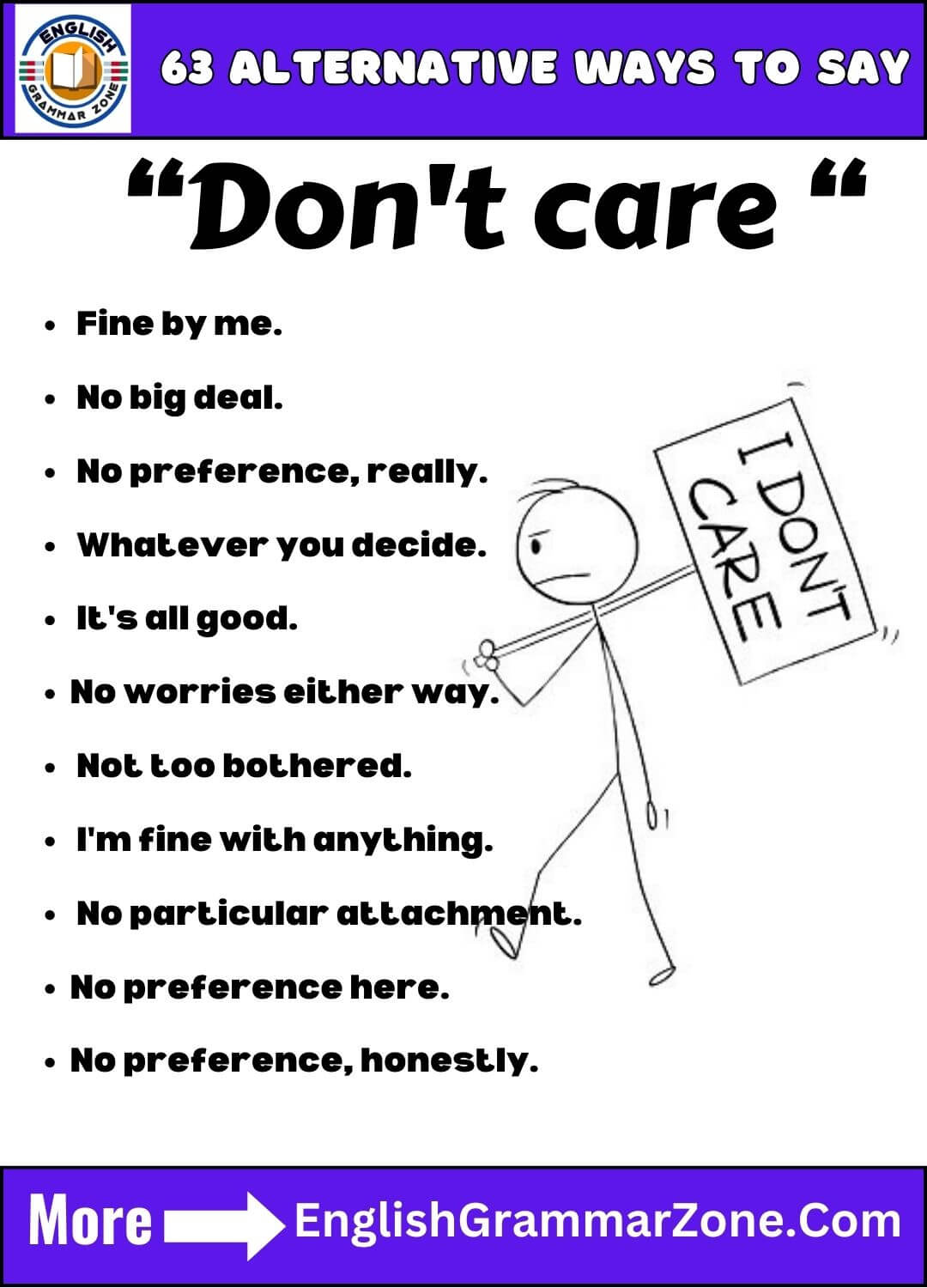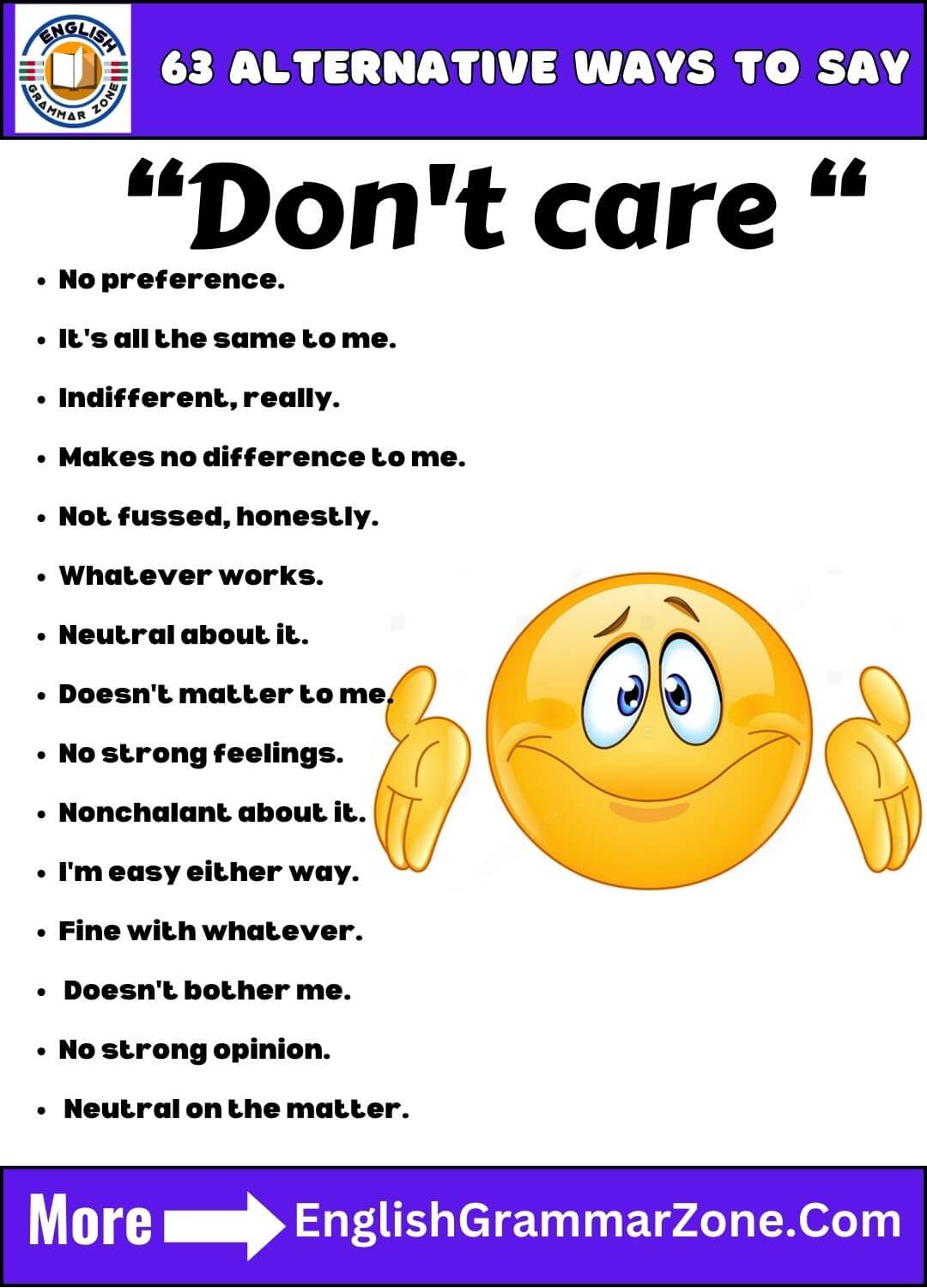When you’re in a conversation and you want to express that you’re not interested or don’t have a strong opinion on something, it’s common to say “I don’t care.” However, using the same phrase repeatedly can feel monotonous or even rude at times. Luckily, there are many alternative ways to say don’t care that can help you sound more natural or polite in your conversations. Whether you’re trying to avoid sounding dismissive or just want to mix up your vocabulary, this guide will introduce you to several phrases that you can use in place of “I don’t care.” These alternatives can be useful in different contexts, whether you’re in a casual chat with friends or a more formal setting. Let’s explore these expressions and discover when and how to use them.
63 Alternative ways to say “Don’t care “
- No preference.
- It’s all the same to me.
- Indifferent, really.
- Makes no difference to me.
- Not fussed, honestly.
- Whatever works.
- Neutral about it.
- Doesn’t matter to me.
- No strong feelings.
- Nonchalant about it.
- I’m easy either way.
- Fine with whatever.
- Doesn’t bother me.
- No strong opinion.
- Neutral on the matter.
- It’s okay either way.
- No particular preference.
- Easygoing about it.
- Open to anything.
- No strong stance.
- Noncommittal about it.
- Cool with whatever.
- Not picky, really.
- Fine by me.
- No big deal.
- No preference, really.
- Whatever you decide.
- It’s all good.
- No worries either way.
- Not too bothered.
- I’m fine with anything.
- No particular attachment.
- No preference here.
- No preference, honestly.
- I don’t have a preference.
- It’s all fine with me.
- Not invested either way.
- No strong opinions here.
- Doesn’t matter much to me.
- No strong feelings either way.
- I’m easy about it.
- Fine either way.
- No preference, thanks.
- Not really bothered.
- I’m not fussed.
- It’s not a big deal to me.
- No preference, no problem.


These alternatives offer polite ways to express indifference or lack of preference in short sentences.
Frequently Asked Questions
What are some polite alternatives to saying “I don’t care”?
Sometimes, “I don’t care” can come across as too blunt, especially in formal settings. If you want to sound more polite, you can use phrases like:
- “I’m indifferent.” This phrase is a neutral way of saying you have no preference.
- “It’s up to you.” This shows that you’re giving the other person the power to decide.
- “I’m not bothered either way.” This implies that you’re fine with any choice made.
- “I have no preference.” A simple and polite alternative that conveys the same idea.
Using these expressions allows you to remain respectful while still expressing that you don’t mind the outcome.
How can I express “I don’t care” in a casual way?
In more relaxed or informal conversations, you can use various phrases to sound more natural. Here are some casual alternatives to “I don’t care”:
- “Doesn’t matter to me.” This is a laid-back way to say you don’t have a strong opinion.
- “Whatever works for you.” This is friendly and shows that you trust the other person’s judgment.
- “I’m good either way.” This phrase is commonly used when you’re okay with any decision.
- “I’m fine with whatever.” Simple and casual, it shows that you’re not picky.
These alternatives help keep the tone light and friendly, especially in casual chats with friends or family.
Are there any alternatives to “I don’t care” that sound more empathetic?
If you’re trying to avoid sounding dismissive and want to express a more empathetic or understanding response, here are some alternatives:
- “It doesn’t bother me.” This shows that you’re okay with whatever the situation may be.
- “I’m okay with whatever you decide.” This phrase reflects support for the other person’s choices.
- “I’m happy either way.” This sounds warm and considerate, implying that you’re flexible and open.
These alternatives allow you to communicate your lack of concern without seeming rude, helping you maintain a kind and thoughtful tone.
When should I use “I don’t care” versus alternatives?
While “I don’t care” can be appropriate in some situations, it’s important to be aware of how your words may come across. If you’re in a conversation where politeness or empathy matters, it’s better to use alternatives to avoid sounding uninterested or rude. On the other hand, if you’re speaking with close friends or family and there’s no need to be overly formal, “I don’t care” might be perfectly acceptable.
In summary, having a variety of alternatives to “I don’t care” can help you navigate conversations more smoothly, whether you’re aiming for a casual tone or trying to sound more empathetic and polite.

